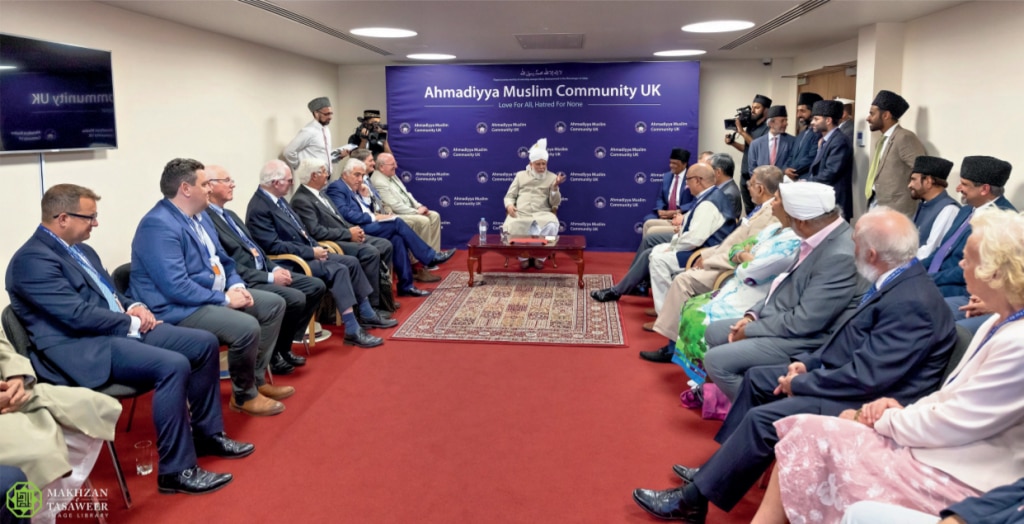Jazib Mehmood, Student Jamia Ahmadiyya Ghana
The Khilafat of the Ahmadiyya Muslim Community pledges allegiance to the Promised Messiahas, who came in the shadow of the Holy Prophetsa. Since his demise in 1908, the Ahmadi Muslim Khulafa have followed the teachings of Islam, the Holy Quran and the Holy Prophetsa in minute detail as displayed by the character and teachings of the Promised Messiahas.
In this regard, the Khulafa also act on the subtle instructions of the Holy Quran.

Today, in the time of Hazrat Khalifatul Masih Vaa, one such example is found in the story of Prophet Josephas, a prophet sent to the Bani Israel.
The Holy Quran has narrated his story at length. When Prophet Josephas was thrown in prison over a false allegation, two youth were also there with him. They immediately recognised that Hazrat Josephas was a pious man, so they asked him to interpret their dreams for them. The Holy Quran captures the scene in these words:
“And with him there entered the prison two young men. One of them said, ‘I see myself [in a dream] pressing wine.’ And the other said, ‘I see myself [in a dream] carrying upon my head bread of which the birds are eating. Inform us of the interpretation thereof; for we see thee to be of the righteous.’” (Surah Yusuf, Ch.12: V.37)
Hazrat Yusuf’s reply is rather curious. First, he assured them that he would answer them in no time. He says:
“The food which you are given shall not come to you but I shall inform you of the interpretation thereof before it comes to you.” (Surah Yusuf, Ch.12: V.38)
But then, he completely digresses and says:
“This is on account of what my Lord has taught me. I have renounced the religion of the people who do not believe in Allah and who are disbelievers in the Hereafter.
“And I have followed the religion of my fathers, Abraham and Isaac and Jacob. We cannot indeed associate anything as partner with Allah. This is of Allah’s grace upon us and upon mankind, but most men are ungrateful.
“O my two companions of the prison, are diverse lords better or Allah, the One, the Most Supreme?
“You worship nothing beside Allah, but [mere]names that you have named, you and your fathers; Allah has sent down no authority for that. The decision rests with Allah alone. He has commanded that you shall not worship anything save Him. That is the right religion, but most men know [it]not.” (Surah Yusuf, Ch.12: V.38-41)
Only after conveying this most illuminating message does he begin to interpret their dreams. So in these verses, Allah the Almighty has subtly pointed to a great way to preach. That is, before you answer an enquiry, take the opportunity to explain your beliefs and your view of things.
Hazrat Musleh-e-Maudra has commented on these verses. He says,
“It seems that Prophet Josephas did not get opportunities to preach. He considered their question to be a blessing and understood that before their need was fulfilled, he would preach so that they felt compelled to listen.” (Tafsir-e-Kabir, Vol. 3, pp. 312-313)
The Holy Prophetsa employed a similar technique of preaching. At the beginning of his claim, he wanted to preach to the chiefs of Mecca but they avoided him and did not listen. So he invited them to a feast of some sort. After eating, he tried to preach to them but they left before he could do so. Hereupon he planned that he would invite them again and before the food came, he made them aware of his claim. This way, the chiefs had to sit while waiting for the food, so he got the chance to have his say. (Tarikh al-Tabari, Vol. 2; Seal of the Prophets, Vol. 1, pp. 181-182 [English])
Hazrat Musleh-e-Maudra also alluded to this similarity of the two prophets. He says:
“We also learn the way of preaching of the prophets. Thus, following them, when preaching or advising, it should always be kept in mind that the message is reached and the person does not also resent it.” (Tafsir-e-Kabir, Vol. 3, p. 313)
The Holy Quran advises us concerning this in the following manner:
ادْعُ إِلَى سَبِيْلِ رَبِّكَ بِالْحِكْمَةِ وَالْمَوْعِظَةِ الْحَسَنَةِ
That is, call unto the way of thy Lord with wisdom and goodly exhortation. (Surah al-Nahl, Ch.16: V.126)
So, in the Holy Quran, not only has Allah the Almighty given us this clear injunction, He has also given us examples to further illuminate the injunction.
Hazrat Khalifatul Masih Vaa has instructed his Jamaat at length over the years to preach with wisdom. However, he does not merely say this. Huzooraa also employs this technique himself. When a journalist or an interviewer would ask a question, it has been noticed that sometimes, Huzooraa would speak in general terms about Islam, the claim of the Promised Messiahas and the truthfulness of Ahmadiyyat before going into specifics. Abid Khan Sahib has written in his diary of Huzoor’s Canadian tour of 2016, “Giving a personal insight into the way he conducts interviews, Huzoor said:
“‘When I get asked questions by journalists, often, I do not answer their question straight away and people may think I misheard; however, I do it on purpose as a means of tabligh [preaching]. I prefer to take the opportunity to tell them about the advent of the Promised Messiahas and how he came in fulfilment of the prophecy of the Holy Prophetsa. Only when I have conveyed this message do I answer their questions.’” (Abid Khan Sahib’s Diary, Canada Tour 2016, Part I, p. 29)
In this way, Huzooraa follows the way of not only Holy Prophetsa, but also Prophet Josephas, as advised by the Holy Quran. Huzooraa has chosen to follow the way of the prophets and preaches in a manner only a truthful one would.

